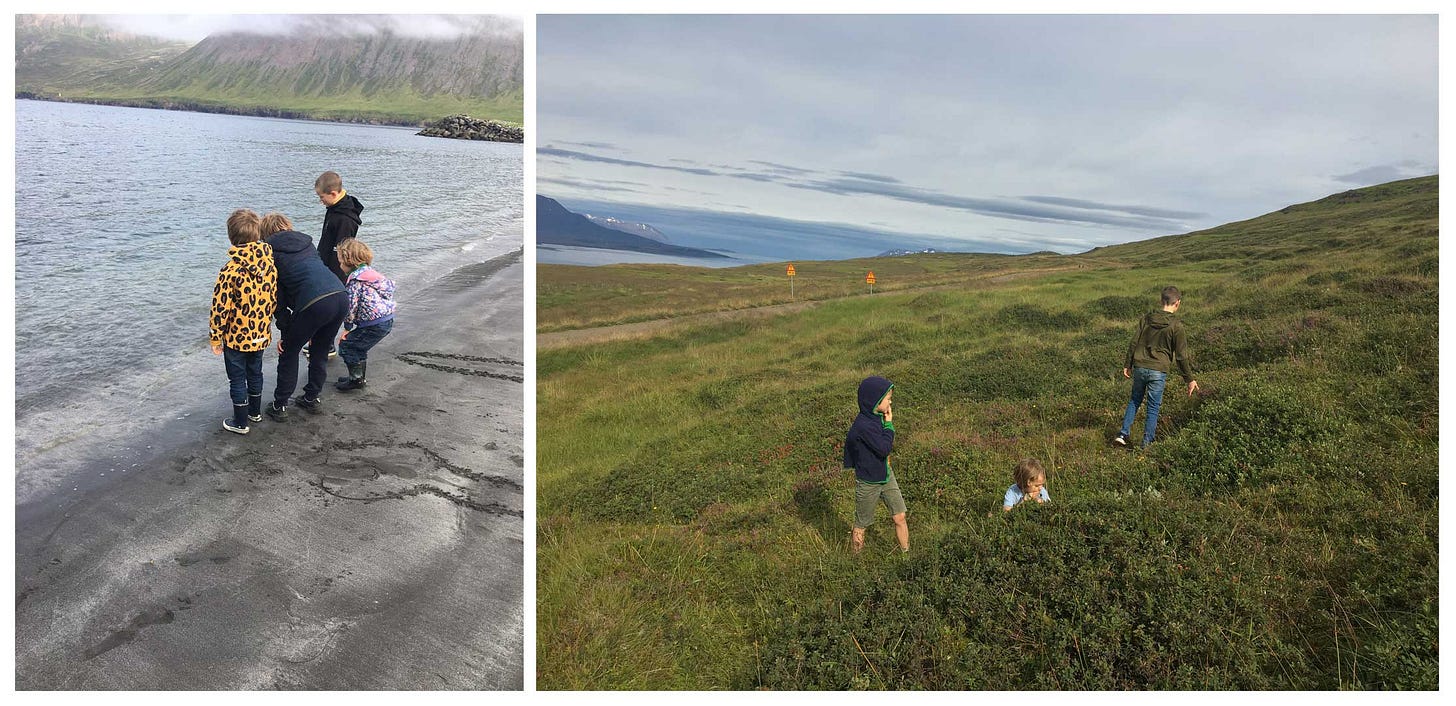THE STRESS OF BEING THE PERFECT PARENT with my guest, CYNTHIA GU from Iceland
Smitten By Faith Issue # 0000037 April 16th 2022
When I launched ‘SMITTEN BY FAITH’ in July 2021, my hope was that the articles in the weekly digital newsletter would cover a variety of subjects and be interesting, thought-provoking and enjoyable. Now, 10 months of unfailing Saturday publishings and 36 amazing Guest Articles later, I am humbled by the positive responses from my readers and the international reach of the newsletter. I am gratified and blown away by the wonderful and contrasting perspectives on life and faith from my articulate and passionate guest writers - from the very first article when we literally “lit the lamp” with Father Thomas Montanaro LC to other articles on subjects as diverse as Suzi Digby Baroness Eatwell’s uniting the world with music to Victoria el Henawy’s Egyptian Queen. And so, today’s subject will bring the readers to yet another vital dimension of life– parenting. And, I could not go further afield for this article - it comes to you - with love - all the way from ICELAND !
Above : The picture perfect landscape of Iceland
My Icelander friend CYNTHIA is a mother of 4 young children who writes under her pen name of CYNTHIA GU. On parenting, Cynthia says that we can all find a greater understanding of ourselves through our children. For Cynthia and her Icelander husband, children are gifts from God; parenting - a joy to be embraced. However, she also admits that it‘s not easy to be a parent and it’s certainly challenging to be a ‘perfect‘ parent. Cynthia and her husband feel blessed that they are able to bring up their happy boisterous kids in the beautiful tranquil countryside in the north of Iceland. Cynthia has taken on the challenges of parenting whole-heartedly – even giving up a career to be a ‘stay-at-home’ mummy while her children are so young. To do so, Cynthia has relied on her Catholic faith and her close-knit Icelander family and friends. She is an involved mother and she joyfully ( most of the time ! ) accepts the obligations and “all the stress” that it takes to raise and educate her children into responsible and moral adults.
Above : Cynthia near her home in the north of Iceland
Cynthia has co-created what she calls a ´Mothering´ blog called ‘Heima með bornin’ ( ‘Naturally at home!’). Take a look at https://moonstone137.wixsite.com/heimamedborn). The blog is about 6 families and specifically 6 women who all have in common, living in Iceland and choosing to be stay-at-home mothers. Their reasons, as you will find out in the blog, are varied and colourful as they work through together the many different issues of parenting, both practical and conceptual that they have encountered. I love that Cynthia used moonstone in her blog. Visually, it’s such a beautiful opalescent crystal – like a big moon – representing femininity and creative and feminine energy. And its physical appearance is so soft and milky – like mother’s milk? Which would be apt indeed since the aim of Cynthia’s blog is to support other stay-at-home mothers through writing about the trials and tribulations of modern parenting. Cynthia bewails the fact that it is now very common for children to be put into care (crèche) at a very early age. Cynthia tells me that in Iceland, 1,900 adults were registered as being ‘Home Makers’ and of this number, 1500 were women.
Cynthia says that as a mother, she continues to try to decipher “…the enigma of life that has been gifted to me” and she has no regrets at all with her decision to be a ‘stay-at-home’ mother. Cynthia’s timely and lovely article on parenting - at Easter – when children in particular are so beloved - will hopefully inspire and encourage people to consider their own worth as parents in the context of this stage of their lives.
So, let‘s hear from CYNTHIA GU who gives her lively perspective on what it takes to be a parent.
____________________________________________________________________________
THE STRESS OF BEING THE PERFECT PARENT AND LEARNING TO ‘GET OVER IT’
By Cynthia Gu, Akureyri, Iceland 16th April 2022
Above : Growing up in bucolic Iceland - Cynthia’s cute little kids
Picture this, mother-in-law comes to visit and I am sitting at my wooden kitchen dining table. It is the beginning of a gloriously sunny morning in Iceland. The blue blue sky, like a screen backdrop to the bright, deep snow that lies all around. Inside, three occupants at the table, with some children milling around in the adjacent living room, are discussing what Amma(‘Grandmother’, In Icelandic) would like to show them on her iPad. She has caught on to the latest Netflix fad, as have nearly all of her generation of the 1940´s here. Usually they stick to "funny cat videos" or shorts on Facebook. However today, Amma is very impressed by a dramatic series called, "The Queen´s Gambit". She proposes to show this to my 11 year old son (T); her grandson.
Very well, I think. Maybe I should check what this show is about before giving the green light to this afternoon´s entertainment. I peruse the reviews to find out that this particular series is rated for a "16 year old audience". Hmm... No.
Amma persists.
"Why not expose him to all the different aspects of the world? After all, this is a fine series; I did not find anything that would be inappropriate for him," she insists.
Ok, I think. Maybe I should examine the reviews. I hardly have time to preview this whole series to decide whether the Censorship Board was justified in their recommendations.
A quick scan of reviews brings up content of ´sex, violence, drug references´... Hmm...No.
This has got my hackles up. I don´t consider myself a particularly closeting-sort of parent. In fact, I insist that we talk about all the big issues that are affecting our community and our world as we experience it.
In Iceland, the schools have found it necessary to introduce sex education at the 6th grade. They talk rather generally and specifically of the mechanics of sexual intercourse. The kids are told that sex is not off-limits but should be experienced at a later date, when one is in a ´loving relationship´. This is generally where it is left.
So, of course when I know that the kids are being introduced to topics such as ´sex education´ I will probe a little to see where their mind-set is at, how comfortable they are with asking me questions, how curious or clued-in they are. And I try to give them a Catholic point of view, prod a little with my own thoughts and ask them for their opinions. Same for the other big subjects. I find this discussion helps prepare the kids´ minds for the on-going discourse that they will have to engage in (whether they are conscious of it or not) their whole lives.
We try to leave it at that. After all, bringing up issues that the child hasn´t been introduced to can lead to unnecessary anxieties. If I had brought up some of the more complicated issues of sexuality and identity, it may lead to a brewing uncertainty of something that I know that they all ready feel comfortable with, even safe. This way, I feel, lies folly.
****
"But you can´t shelter them from the outside world, Cynthia!" I hear Amma say.
"What about educating them on the depravities of war or... what if they were subject to the conditions of war?" declares Amma.
I am at once scandalised by this statement and dismayed. I respect this lovely, grand, old lady dearly; with her staunch opinions and her impeccable sense of style, her latent rebelliousness and generous appeal to her family.
But despite my protective nature regarding my children, I, too feel the pull of the approval of society. This modern battle cry, "Everything is good!", "Prepare them early!", "Don´t hold back any of the taboos," is loud and clear in Icelandic schools. I believe this stems from the idea that educating children will provide them with the tools to make "good" decisions in their lives ahead.
I agree with this, to the same extent as I want my children to be embraced by the society that they grew up in, but I don´t necessarily want them to follow all the mantras to the letter. How do I do both? Is this a cross-roads that my hereto, all-embracing parenting cannot overcome? Am I after all, trying to just please everyone? Surely, a perfect parent would be able to discern exactly what to do!
A recent letter from the school outlined to us parents how children are now perusing porn on the internet at the average age of 11 years old. I was appalled, and shocked. I suppose, growing up as a good Catholic girl I received the message very early that sex was taboo and to be avoided by children. However here, porn is a bit of a grey area. Parents are merely asked to discuss the consumption of porn with their children in order to discourage it. Is that not unnecessarily sexualising children? What happens when innocence is abruptly attenuated?
The other thing is that I am a foreigner, not of Icelandic breeding. I am bound to have a different outlook, if not standards for my children. This conversation with Amma had ticked me off in a number of ways:
I was juggling my perception of being a "perfect parent" once again. Doing the right thing in the eyes of those around me, the society I lived in and what I regarded as my own good judgement (let´s not bring the father into this; he was taking a nap at that point).
The difficulty of accepting the unsettling feelings that were competing within me in order to live with the contradictions of what I thought and what was occurring around me.
Feeling the general need to rebel (as I am prone to do with people who try to tell me how to parent).
Here I was, sitting at the breakfast table, trying to assert my parental authority. I don´t generally like to do this if at all possible to avoid. But sometimes my boundaries get crossed. I sighed…, I disliked being at odds with the children´s grandparents or anyone else for that matter. But there was no way around it this time.
"Yes, I agree Amma," I said tentatively. "I agree that children are subject to all sorts of circumstances that they were protected from even only a generation ago," I conceded. "But, I don´t think that it helps or is healthy to open up children´s minds to ideas that they are not ready for; like porn or adult issues that they aren´t mature enough to appreciate in all their complexity."
Amma considered this for a while.
"What about when they go to their friends´ houses and become exposed to or participate in those experiences that you protect them from here?" she said.
She had me there.
What am I supposed to do when other people´s parents aren´t as cautious as we are? What if they let their children, through the little contraption (smart phones) that they carry around with them, have access to every part of the big, scary internet? She had a point.
"Well," I hesitated, "I guess I can´t ever know truly what my kids are doing in the private space that they play with their friends, if their friends have a smart phone or computer,"
I looked at T, who had been sitting, sheepishly watching this heated exchange between his grandmother and his mother. T shook his head vehemently, as if to refute any participation in any of those embarrassing issues.
"But you can´t tell me that in your day," I said, "you weren´t exposed to sex, drugs and rock ´n roll," I said, in a hope to make an example of a stereotype that I knew of.
Suddenly, T (11 years old), who had been sitting quietly hopeful, at the table, eagerly listening to the inevitable outcome of this sparring for his television time, piped up.
"What´s so bad about rock ´n roll?" he asks.
"Well," I start, trying to line up an explanation that wouldn´t be too boring but succinct enough to be relevant to the conversation.
"Rock ´n roll developed as a genre of music out of the post-War periods, and when people´s ideas of what was permitted and proper were being challenged. Also, the changing roles of women in society, due to the necessities of surviving during war time and afterwards meant that there was a general atmosphere of people pushing boundaries," I explained.
"So what kind of things do you mean by pushing the boundaries?" asked T.
"Well, things like sex, lust, desire were not thought to be good to talk about... amongst adults," I added. I felt it was important to say that some things, whilst appropriate and applicable to adults are not considered general topics for children, since it (should not) apply to them.
Also, how do I deal with the fact that my child may be exposed to material that we haven´t prepared him for? This is a conversation both about trust and giving him the tools to engage and analyse whether the material should be partaken of or how to consider it, if it is confronting. I feel the key is maintaining a good sense of the child´s maturity and readiness for adult issues; maintaining a good communication and knowing when to open up an area that needs clarification. Of course, there may be things that my child feels uncomfortable with voicing. However prematurely exposing a child without our knowledge or consent may happen, in which case I would say that I would have to trust my child to a certain extent that he/she would express their confusion or perturbation.
A good friend expressed how she felt it was the parents´ right to open up difficult areas of discussion with their child, since they have the responsibility for guiding and nurturing them to adulthood. The adults that our children become should be due in large part to the preparation undertaken by their parents. I feel that when we, as a society chant the mantra of "openness" and liberty we forget that there are two sides to the debate: the subject matter we are discussing and the manner in which it is discussed. The discussion can be shamelessly lead in order to fulfil some agenda. This manner of leading can be very unconscious to the consumer or listener.
When a discussion topic, like sex is opened up, the manner it is presented can issue a moral judgement, a definite direction on where the discussion will proceed. For instance, if I were to talk about apples and I know it is a difficult subject for my fruit-loving friends, who may have been hurt by the flagrant consumption and exploitation of this crop, and my opinion were that all apples should be consumed with great abandon regularly, I might open the discussion by saying, "As we all love fruit, but know how terribly important it is to discuss the protection of them; we should first start by agreeing that they are necessary for our health, " Or some such declaration of a basic truth. Then I would proceed by saying how ignorant it is for people who will not eat fruit to neglect its health- giving properties.
You get where I am going? And before long, I have you feeling utter regret that you don´t eat apples every day. Forget the fact that you have never liked apples, nor that you live in a climate that isn´t capable of cultivating apples. So, in the same way when we insist on how important a topic like sex is for children, we completely forget that the issue is much more complicated. The discussion can be led in such a way as to only consider a limited number of issues, which is in fact, not "open" or "liberal" in thinking at all.
Where was I going with this? Right. Watching TV. Tainting the innocence of our precious babes. Also, what is the point of directing some person´s opinion to make a judgement? I suppose, as an adult and parent I would say it is our responsibility to shelter, guide and nurture our children as they learn and grow. In my opinion, TV presents some pre-digested opinions that don´t make the complex issues a fair playing ground. When a movie like "Bohemian Rhapsody", a vivid biography of Freddie Mercury´s tragic life portrays him as a role model, albeit with grave flaws, I don´t see it as a fair debate. Does a child, who is exposed to this film really appreciate how saddening Mercury´s choices were for his parents? How about if he were to choose another path - stay with the woman he had married? These issues are hardly explored.
Presented before a blank page (read, the child) and you have (without them knowing) sent them a number of messages about life. For instance, Freddie Mercury´s various decisions in life should be emulated and adored, after all, he was such a role model! One is frankly, never given the space to challenge the messages, not even to contemplate them because of the medium they are present through.
So, coming back to T, who was still avidly awaiting the final decision as to whether he might partake of any media consumption today. T shifted positions in his chair, uncomfortably. He didn´t know what to make of this debate. I could see that he was considering that any protest he might make would seem disloyal to his Mother. I grimaced at the position I had put him in. In fact, this wasn´t a fair position to put any child in; subjecting them to the inconsistencies of adults´ perspectives. I chose to fix myself another cup of tea. I could see this gave T the opportunity to retreat into his room. He knew that the hope for more TV this afternoon was lost. Poor thing.
Then Amma recounted,
"I remember when your husband was five years old and I took him to a performance of the theatre production, ‘Little Shop of Horrors’. He was so scared that he fled."
"I think perhaps that was a mistake," she conceded.
I shared a smile with her, relieved for her concession. Amma always did have a way of showing someone that their opinions counted too, despite her personal convictions.
***
When the day was over, I lay in bed, thinking over the events of the day; that conversation with Amma in the kitchen had thrown me. Did any good come of it? Maybe after all of this, instead of trying to indoctrinate children, we should place emphasis on analysing the messages and mediums that they are exposed to? Or maybe the most important part of this conversation was that even though people don´t share similar convictions that we can still appreciate each other´s positions? Or simply, this wasn´t a case of winning or losing an argument; of being right or wrong, but simply that we had undertaken to express and appreciate each other’s differences.
At the end of the day, Amma and I were still friends; T discovered that he couldn´t watch just any type of media whenever there was a tablet available but perhaps, when he undertook to discuss the issue with his friends (or even other adults?), he would bring up some of these issues in a calm and even manner.
After all, it´s not easy, being perfect. :)
Left : Children sketching a scene outside their school fence. Could they be sketching the big cruise liner docking in the distance ?
Right : Out of wonderland - a small church in Akureyri, Iceland - its bright red roof glowing against the bright blue sky !
____________________________________________________________________________
Editor’s Note :
Dear Reader, thank you for reading this weekly edition of SMITTEN BY FAITH.
ALL articles in every issue are FREE.
For those of you who upgraded to be a PAID Subscribers for US$ 60.00 a year, thank you so much ! All proceeds go to the Regina Apostolorum Foundation to promote Catholic higher education.
PAID Subscribers will also receive via Bitly link ( see the posts pinned above available only to paid subscribers ) the digital copy of the recent book by Joan Foo Mahony, ‘LATE HAVE I LOVED THEE’ and THE COLLECTED ARTICLES, VOLUME ONE 2021 of Smitten By Faith, a DIGITAL COMPILATION of all the previous year’s 2021 articles.
And, at the end of 2022, you will receive THE COLLECTED ARTICLES, VOLUME TWO 2022.
Simply click on the relevant Bitly links to receive the publications.
Paid Subscribers will also receive additional exclusive material from time to time.







